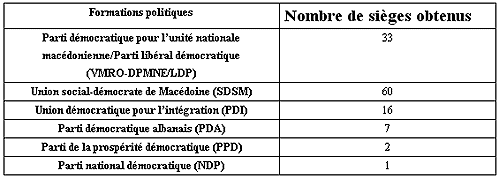News
Corinne Deloy,
Fondation Robert Schuman,
Helen Levy
-

Available versions :
EN

Corinne Deloy
Fondation Robert Schuman
Helen Levy
The holding of these elections was like mission impossible. After an electoral campaign that was punctuated with a number of violent incidents and which, it was feared, would disrupt and at worst jeopardise the vote, the general elections progressed in the utmost calm and serenity on 15th September in Macedonia.
Alain Le Roy, EU representative in Skopje was eager to congratulate the "spirit of democracy and dignity" that surrounded the election; he even pointed out that this fourth general election since Macedonia gained its independence "was the most democratic in the country's history". Javier Solana the EU's High Representative for Foreign Affairs welcomed Macedonian commitment "in favour of peace and democracy» and declared that "that after a year of peace, the elections show that Macedonia can look to a happier future within Europe". A thousand observers, 800 of which, appointed by the Organisation for Security and Co-operation in Europe (OSCE) supervised the election. A delegation of 16 parliamentarians from the Council of Europe also attended the vote.
Ms Miriana Lazarova-Trajkovska, president of the electoral commission confirmed the victory of the opposition parties. The coalition «Together for Macedonia» led by Branko Crvenkovski's Social Democrat Union (SDSM) won 40.4% of the vote, far ahead of the government coalition (VMRO-DPMNE/LDP: Democratic Party for National Macedonian Unity –Democratic Liberal Party), led by the Prime Minister Ljubco Georgievski, who won 24.4% of the vote. The outgoing Prime Minister immediately acknowledged his defeat. Ali Ahmeti's Democratic Union for Integration (PDI) won his wager and with 11.8% ie 70% of the Albanian population's vote, is now the leading Albanian speaking party in Macedonia way ahead of his rival Arben Dzhaferi's Democratic Albanian Party who won 5.2% of the vote. The latter also insisted on congratulating his adversary on the result. Finally the Democratic Prosperity Party (PPD) led by Abdurahman Haliti won 2.3%.
As soon as the results are officially announced, President Boris Trajkovski has ten days to appoint a Prime Minister who in turn will have a maximum 20 days to form a new government. The social democrat Branko Crvenkovski should therefore be the next Prime Minister of this Balkan State. However since he does not enjoy an absolute majority in Parliament a government coalition will have to be created. Throughout the electoral campaign the SDSM leader said that if he won he would suggest an alliance with the Albanian speaking party victors of the elections. He also stated that it would be out of the question for former UCK member to be part of his government. He now finds himself in a difficult situation. On the one hand he is under pressure from the international community to form a government coalition with Ali Ahmeti's PDI; on the other hand he has to take into account what the majority of Macedonians want and they condemn any alliance with a party from the guerrilla and think that Ahmeti is a terrorist who has only one aim; the division of Macedonia. What the former Albanian rebel leader says today though is radically opposite the aims he had just a few months ago. The Albanian leader has indeed promised to work towards democracy, "to apply the Ohrid agreement and harmonious ethnic co-habitation (...)we are openly striving to clear away ethnic barriers completely. We are preaching peace and a totally European direction" he declared a few days before the election.
Ljubomir Frckoski, adviser to President Trajkovski, said he was in favour of integrating Ali Ahmeti into a future government coalition. The final decision lies with Branko Crvenkovski who is certainly not unaware of the dangers for the stability of Macedonia if the leaders that the Albanian population have elected are excluded from the government.
General elections on 15th September comprised the last stage in the peace process that started just over a year ago after seven months of violence between government forces and the Albanian guerrilla. At the end of the election Alain Le Roy, the EU representative in Skopje stated "This is an important step towards reconciliation but it is not the last". Let's hope that in the future the new leaders of the Balkan Republic will show the same maturity that the Macedonian population demonstrated during these elections.
Results of the general elections 15th September 2002:
Participation : 70%

On the same theme
To go further
Elections in Europe
Corinne Deloy
—
20 January 2026
Elections in Europe
Corinne Deloy
—
13 January 2026
Elections in Europe
Corinne Deloy
—
4 November 2025
Elections in Europe
Corinne Deloy
—
28 October 2025

The Letter
Schuman
European news of the week
Unique in its genre, with its 200,000 subscribers and its editions in 6 languages (French, English, German, Spanish, Polish and Ukrainian), it has brought to you, for 15 years, a summary of European news, more needed now than ever
Versions :



